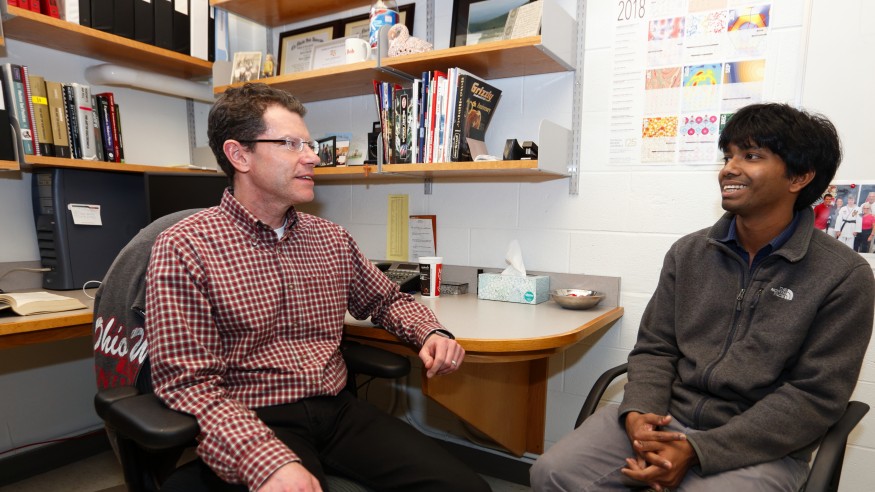
Battling Data Breaches
Ohio Wesleyan Alumnus Using Physics to Improve Safety of Online Information
Recent developments in practical quantum computers could pose a threat to encryption techniques that secure online data, including banking and medical information. Ohio Wesleyan University alumnus Taimur Islam ’13 is working to keep such data safe.
Since graduating from OWU, Islam has earned his Ph.D. in physics from Duke University. Soon, he will begin conducting postdoctoral research at The Ohio State University. His research involves developing encryption technology to secure the internet from the threats of quantum computing.
Islam returned to OWU this semester to deliver the 2018 Muller Award Lecture, “Quantum Encryption: Internet Security in the Age of Quantum Computing Era.”
Currently, digital information that’s transmitted is encrypted so it is unintelligible to hackers. The data can’t be intercepted unless a hacker has the same encryption key that was used to transmit the information, Islam, an OWU physics major, explained to his audience. But quantum computing will be faster than classical computing and has the potential to break encryption keys.
Islam discussed ways in which information could be transmitted securely. One such way is through cryptographic methods. Quantum Key Distribution (QKD) guarantees security because of the laws of quantum mechanics, he said.
One of the fundamental properties of quantum mechanics is that measuring electrons or photos changes their properties. QKD takes advantage of that property to exchange encryption keys in a way that alerts parties if a security breach occurs.
The disadvantage of some of these QKD systems is that they transmit keys at slow rates. Adjusting the time at which the photon is released enables the system developed by Islam and other researchers to encode two bits of information per photon instead of one, according to information published by phys.org.
During his time at OWU, Islam conducted research in nuclear physics with Robert Haring-Kaye, Ph.D, professor of physics and astronomy, who invited him to come back and speak with current students.
“His research has important implications for the security of private information transfer,” said Haring-Kaye, who was Islam’s OWU mentor. “It also has been regarded highly by the applied physics community, as Taimur has had several recent publications in prestigious peer-reviewed journals.
“Although his research is very complicated,” Haring-Kaye said, “the talk that he gave at OWU was pitched at the perfect level for our audience, so that even our first-year students could understand the basic principles behind his research without having the necessary background in quantum mechanics to appreciate the subtleties and intricacies of his experiments and their results.”
Islam said he has benefited greatly from his Ohio Wesleyan experiences, including his participation in the University’s 10-week Summer Science Research Program.
“Some of the things I did with him, I still apply those analysis techniques today,” Islam said, “so the first research experience I had got me started into doing research.”
